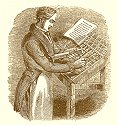George Wilson was, according to Lawley, the printer of first book we know to have been printed in Wolverhampton. It was produced in 1724. This date may seem late but, bearing in mind the very limited amount of printing which went on anywhere outside London, Oxford and Cambridge, and the size of the town at the time, it is not surprising. There may have been printing done here earlier but, if so, no record of it seems to have survived. The book was entitled "A true testimony for God and his sacred law; being a plain, honest defence of the first commandment of God against all the Trinitarians under heaven". It was written by Edward Elwall, an enthusiastic Unitarian, whose beliefs this book defends. Elwall lived in Wolverhampton where, he claims, "his ancestors had lived for above eleven hundred years, ever since the Saxons conquered the Britons". The book, which bears the very precise date of 8th March 1724, was only 72 pages long but its contents were enough to enrage the local clergy who managed to have Elwall prosecuted for blasphemy in 1726. It is not recorded but his book was almost certain to have been used in evidence against him. He was acquitted. It was a fiery start to local printing. Lawley found two other books printed by George Wilson, both reprints of books originally printed in London and popular there. One was Captain Robert Ronal’s "Adventures in Several Parts of the world", which is dated 1774; and the other was Thomas a Kempis’ "Imitations of Christ" in Stanhope’s edition, dated 1746. Despite that date Lawley thinks that Wilson died about 1745 but Mander records his burial on 30th December 1748. The next book Lawley finds is an anonymous devotional work "The Christian Pattern", which was printed in 1755 by Mary Wilson. Lawley says that he is inclined to think that these books, and others, were not printed and published by them at their own expense and risk but as jobbing printers for other booksellers. He says that their printing premises were in Townwell Fold and their shop was "a little diamond paned dwelling in Cock Street (now Victoria Street) not far from the ‘Old Barrel Inn’." Mander says that Mary Wilson was "probably" George Wilson’s wife, that the account of the whereabouts of their premises is "tradition" and asserts that "the output of the Wilson’s was of the chap book type and without doubt had a large circulation". Mander does not give his evidence for those assertions. When Mary Wilson stopped printing is not known. Lawley suspects that Thomas Smith was apprenticed to the Wilsons and it must therefore be possible that he took over the business when Mary Wilson retired or died. |

